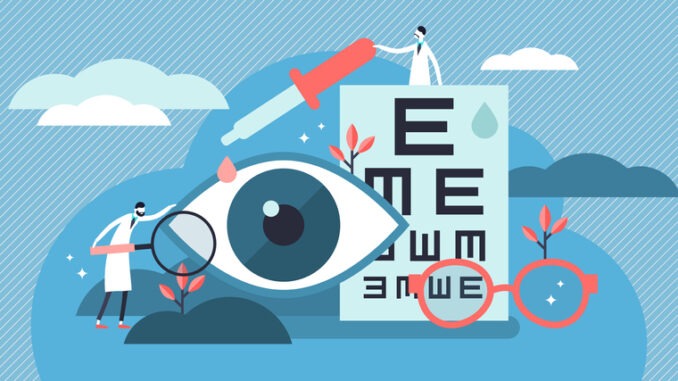
What is eye yoga, and how can it help us in these digital times? Kat Nicholls explores
CREDIT: This is an edited version of an article that originally appeared on Happiful
My eye health is something I’m keenly aware of – perhaps because, nearly 15 years ago, I became blind in one eye. After wearing contact lenses while wakeboarding, I developed an infection; this led to a stint in hospital where I heard stories of a surfer who lost sight in both eyes with the same infection. I felt lucky and unlucky all at the same time.
My healthy eye is working hard but, as a short-sighted person with a -7.5 prescription, the fact is I would be completely incapacitated without my glasses; suffice to say, I want to do all I can to maintain what remains of my eye health. In the last couple of years, though, I’ve noticed a deterioration in my sight, and I’m not alone; according to a YouGov poll from the charity Fight for Sight, one-in-three people have noticed their eyesight worsening as a result of increased screen time during the pandemic.
So, what can we do to support our eye health? A wellness trend claims to have the answer – eye yoga – and it is exactly what it sounds like, eye exercises and stretches designed to keep our eyes healthy. Some enthusiasts claim it can improve vision, but science doesn’t back this up just yet. Nevertheless, it can be seen as a helpful way to ease eye strain and strengthen muscles in the eye area.
With yoga in the name, the practice also encourages us to take time to be mindful; when doing the exercises, try to take deep breaths and be truly present. We so rarely give ourselves these moments of pause, but they can help reduce stress and overwhelm, helping us feel more capable and in control.
Intrigued? Here are some eye yoga exercises to try…
Palming
This is a lovely way to give tired eyes a break; try it after a long day in front of your computer.
- Rub your hands together vigorously to create a sense of heat between your palms.
- Place your palms over closed eyes and take a few deep breaths. Enjoy the warmth and darkness, and notice how your eye muscles relax.
- Stay like this until the heat dissipates.
Blinking
Our eyes can become dry when tired; this exercise is ideal to revitalise and lubricate them.
- Sit up straight and look directly ahead.
- Blink quickly for five-to-10 seconds.
- Allow your eyes to close gently for a few seconds before continuing with your day.
Focus shifting
This exercise helps to strengthen the muscles in our eyes and is a fun challenge.
- Stretch out your left arm in front of you and make a thumbs-up sign with your left hand.
- Stay focused on your thumb while you slowly move your arm to your right, as far as you can without moving your head or neck.
- Next, slowly move your thumb back the other way, far over to the left, staying focused on it throughout.
- Repeat a couple of times.
- Close your eyes to rest them for a few seconds before continuing with your day.
Eye-rolling
Another strengthening exercise, eye-rolling is also a chance to practice mindfulness; what do you notice around you as you roll your eyes?
- Sit up straight and slowly look up above you towards the ceiling, keeping your head still.
- Roll your eyes over to the right so you’re looking as far right as you can.
- Roll your eyes down to the floor.
- Roll your eyes towards the left.
- Roll them back up to the ceiling.
- Look straight ahead and take some deep breaths before repeating in the other direction.
If your eyes are feeling tired, or you’re feeling unwell, avoid the strengthening exercises and instead focus on the ones that offer a chance to rest.
Alongside eye yoga, it’s important to be aware of general eye health tips promoted by experts, such as:
The 20:20:20 rule – for every 20 minutes of screen time take a break, focusing your eyes about 20 feet into the distance for 20 seconds. Visit ergonomictrends.com/20-20-20-rest-eyes-health-tool for a helpful desktop timer.
Get regular eye tests – getting your eyes looked at by professionals regularly (even if you don’t notice a change in vision) gives them the chance to spot emerging conditions early and discuss any concerns with you.
Protect your eyes – this means wearing safety goggles when necessary, sunglasses when sunny, and not wearing your contact lenses in water.
Eat to support eye health – eating a balanced diet rich in vitamins C and E, omega-3 fatty acids, and zinc can go a long way in supporting eye health. Enjoy leafy green veg, oily fish, nuts and citrus fruits to reap the benefits. It’s also helpful to stay hydrated; our eyes need moisture, so keep up with your water intake.
When it comes down to it, being able to see is an incredible privilege and something we shouldn’t take for granted. By taking care of our eyes we’re protecting our future vision and I hope you now see this as clearly as I do.


Be the first to comment